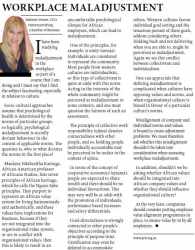KZN Business Sense - Workplace Maladjustment:Melanie Veness CEO Pietermaritzburg Chamber of Business2016-04-28 I have been studying maladjustment in the workplace as part of a course that I am doing and I must say that I find the subject fascinating, especially in relation to culture.
Socio-cultural approaches assume that psychological health is determined by the norms of particular groups, so logically, psychological maladjustment is socially deviant behaviour in the context of applicable norms. The question is, who or what dictates the norms in the first place? Maulana Ndabezitha Karenga, African-American professor of Africana Studies, lists seven principles of African heritage, which he calls the Nguzo Saba principles. They purport to represent an African value system for living harmoniously and authentically, and these values have implications for Business, because if they are not integrated into the organisational value system, or are in conflict with organisational values, then this is likely to result in an uncomfortable psychological climate for African employees, which can lead to maladjustment. One of the principles, for example, is unity (umoja). Individuals are considered to represent the community. Most people from western cultures are individualistic, so this type of collectivism is quite at odds with this norm. Acting in the interests of the whole community might be perceived as maladjustment in some contexts, and one must question the fairness of such an assessment. The principle of collective work responsibility (ujima) denotes connectedness with other people, and so, holding people individually accountable may be perceived to be unfair in the context of ujima. In terms of the concept of cooperative economics (ujaama), people are expected to share wealth and there should be no individual favouritism. This may very well be at odds with the promotion of individuals, performance based increases and salary differentials. Goal-directedness is strongly connected to other people's objectives according to the principle of purpose (nia). Gratification may even be delayed to accommodate others. Western cultures favour individual goal setting and the tenacious pursuit of these goals, seldom considering others. Holding back and not delivering when you are able to, might be perceived as maladjustment. Again we see this conflict between collectivism and individualism. One can appreciate that defining maladjustment is complicated when cultures have opposing values and norms, and when organisational culture is biased in favour of a particular culture's norms. Misalignment of company and individual norms and values is bound to create adjustment problems. We must therefore ask whether this misalignment shouldn't be taken into consideration when assessing workplace maladjustment. In addition, shouldn't we be asking whether African values should be integrated into African company values and whether they should influence organisational culture? At the very least, companies should consider putting employee value alignment programmes in place, to ensure value by-in by all employees. www.pcb.org.za |
KZN Business Sense - Workplace Maladjustment:Melanie Veness CEO Pietermaritzburg Chamber of Business
Copyright © 2024 KwaZulu-Natal Top Business
